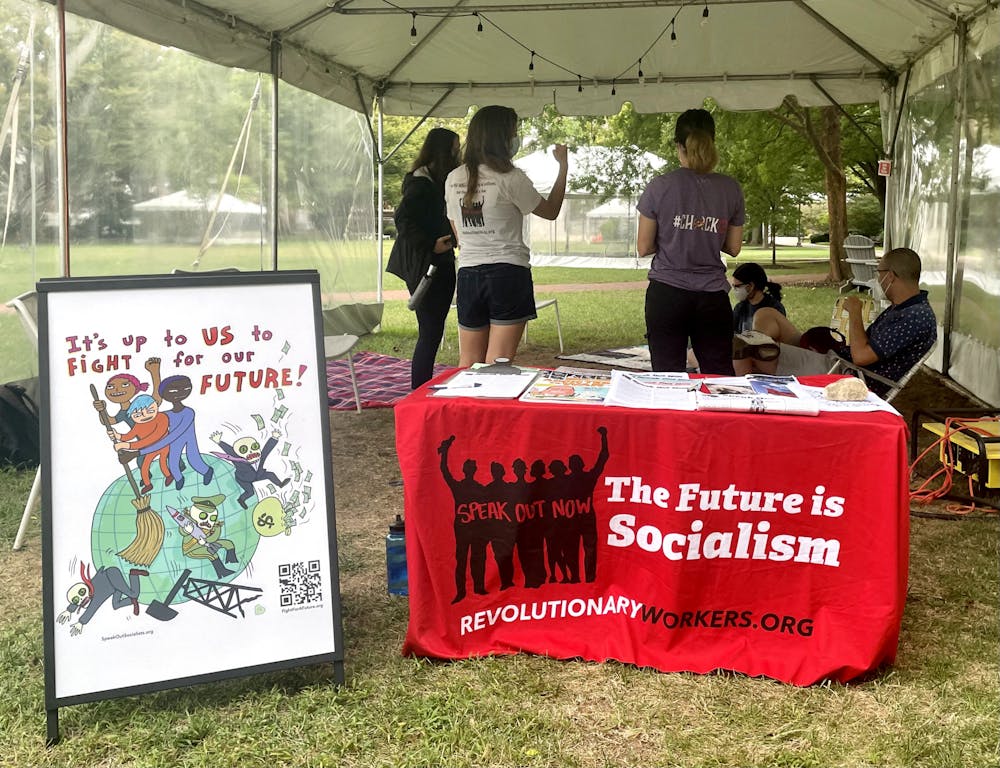A year and a half after George Floyd protests began, a socialist organization called Speak Out Now hosted a discussion about police brutality at Keyser Quad on Sept. 16. At the event, club members examined the idea of capitalism as the root cause of the inequities in society, arguing that socialism is the solution.
Though Speak Out Now is located in different regions of the U.S., its members are in the process of establishing a club at the University, known as Students for Socialism. The club will share in the same mission as Speak Out Now but remain separate from the national organization.
Senior John Burns, president of Students for Socialism, asserted that the club is meant to provide students with an outlet to articulate their political questions and figure out solutions.
Burns explained the purpose of bringing the organization to the Hopkins community in an interview with The News-Letter.
“We believe that we cannot rely on the people in power to make the changes we want to see. People in power have either done nothing or the situation has become worse,” he said. “For example, Biden has expanded the police budget. Because of that, this is a time for people to understand the world and figure out what the problems are.”
Burns hopes that the organization will unite students and build a community among those who want to take action against society’s most pressing problems, including racism, climate change and poverty.
Hopkins Alum Megan Johnson, a member of Speak Out Now, opened the discussion by stressing that society has an obligation to continue the conversations surrounding police brutality.
“A year and a half ago, the brutality of the police was shoved into the view of tens of millions of people. Police brutality maintains the social and economic inequalities of capitalist society,” she said. “This social explosion sparked discussions over the last year over the role of the police and what a restructuring of systems would take.”
According to Johnson, approximately 80% of working-class Americans are living paycheck to paycheck and over half a million people are experiencing homelessness. Based on these statistics, Johnson highlighted that the majority of Americans cannot be considered safe, which would entail having a secure job, a place to live, and access to health care, education and basic necessities.
When discussing police brutality, Burns believes that the core issue lies in capitalism.
“Police are a solution to the violence of our society. Nothing about our lives is guaranteed. Because of that and the massive inequality we have in society, the police exist to protect property but not people,” he said. “Because of that, removing the police does not get rid of the root causes of these problems. Until we begin to address the issues of inequity that capitalism creates, we’ll be stuck living in a violent society.”
Lena Davenport, another member of Speak Out Now, stressed that socialism is grounded in the belief that the working class is essential for the world to progress and transform society.
“We need to understand our own opinions and analyze what is going on in society. If socialism is a world built by working people, then we need to start now,” she said. “Racism has continued. Police killings have continued. Poverty has continued. When we talk to students, a lot of them bring up police and racism as something that’s on their minds and they want to change.”
Freshman Novie Truitt stated that she comes from a conservative hometown and described her surprise when some of her friends decided to join the police force rather than go to college after the George Floyd protests.
“It caught me off guard and made me really upset. The pushback against Black Lives Matter is becoming worse and more widespread,” she said. “I saw more rallies supporting the police than the Black Lives Matter movement. It made me very interested to learn what I could do so that it wouldn't be as prevalent.”
She expressed her belief that the capitalist society is hindering society from reaching its full artistic and creative potential.
As a result, Johnson believes that it is important for communities to continue the fight. She commended activists in Baltimore for holding protests in communities that are most affected by these issues rather than staying in the safer areas.
“It’s important to remember that it feels more powerful as a collective action rather than when you’re alone,” she said. “Hopkins is really bringing so many of us that wouldn’t normally get to talk or hear about each other’s experiences. It shows how similar a lot of our situations can be in different places and how it can spread in different ways.”
In an email to The News-Letter, Truitt noted that as a white woman she has been privileged to avoid issues like police brutality. Coming to Hopkins has allowed her to engage in conversations about these topics.
“It’s really important to me to make the effort to understand the perspectives of people in the margins since I didn’t grow up always being able to encounter those perspectives, being from such a conservative area in Delaware,” she wrote.
She asserted that the University should provide students with more opportunities to have conversations and learn from one another.
Sophomore Rafael Stamillo attended the event because he wanted to discuss topics related to socialism. He emphasized that these events are important for students to understand other people’s perspectives.
“It brought more topics to my attention. I don’t think my points of view changed, but they are more complete,” he said. “Maybe I’m not aware of something but others are, and we can all share these ideas and have a more complete understanding of what we should do for our future.”
Speak Out Now will be holding further discussions in the coming weeks.





